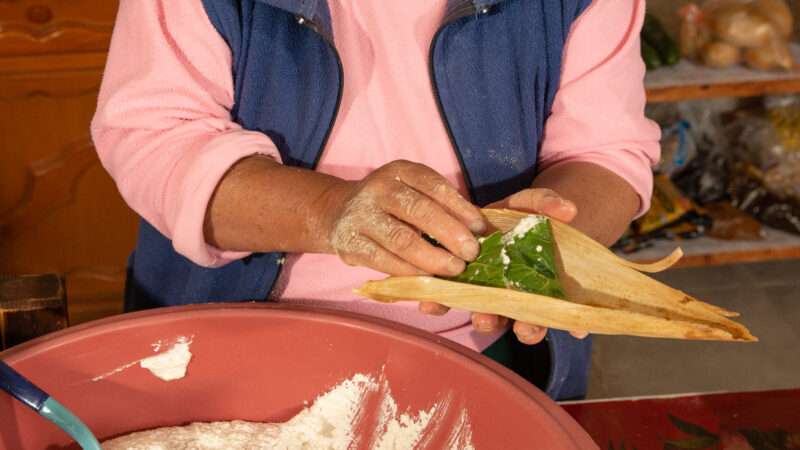
Neighbors can host backyard barbecues. Churches and schools can organize potlucks. And sports fans can have tailgate parties. But if anyone tries to sell homemade meals, code enforcers in most states will shut them down.
Hypothetical worst-case scenarios scare lawmakers, so they block home chefs from using their own kitchens to make money selling anything that requires refrigeration. Homemade pizzas, puddings, and pumpkin pies are off-limits. Even lemonade stands are illegal in some jurisdictions.
The rationale is simple: Better safe than sorry. Arizona Gov. Katie Hobbs used this excuse on April 18, 2023, when she vetoed a so-called "tamale bill" that would have created a new source of income for immigrants and other home-based chefs. "This bill would significantly increase the risk of food-borne illness," Hobbs wrote in her veto letter.
It sounds scary. Yet new data from our public interest law firm, the Institute for Justice, dismantles the narrative. States that allow home chefs to sell perishable foods report no confirmed cases of relevant foodborne illness. Zero. Zilch. Nada.
To make sure, we inspected public records from states with the fewest restrictions on "cottage food," which refers to homemade food prepared for sale. The list includes California, Iowa, Montana, North Dakota, Oklahoma, Utah, and Wyoming. Most other states and Washington, D.C., limit the cottage food menu to shelf-stable items like cookies and jams. But these seven states go further.
As champions of food freedom—the right to buy, sell, grow, and advertise locally sourced and prepared foods—they allow home cooks to sell perishable foods that require refrigeration.
Critics gasp at the boldness, but doomsday predictions about foodborne illness have never materialized. Across the seven states, public records show only two instances of suspected foodborne illness from homemade meals sold under those states' laws, and neither case was confirmed nor serious.
Exercising caution makes sense when dealing with the unknown, but policy makers no longer need to speculate about safety. People working in their own kitchens have proven they can handle perishable foods responsibly.
California chef Elijah Brown knows why. He sells homemade coleslaw, mashed-potato balls, tacos, briskets, ribs, and chicken at his loft apartment near San Francisco and has yet to receive a single complaint after more than two years of operation.
Part of the reason is the built-in controls that come with a home-based enterprise. Most of these businesses are small, so owners do not have to worry about unsupervised employees. Food processing plants, in contrast, must manage hundreds or thousands of workers—and supply chains that sometimes span hundreds or thousands of miles.
The second reason is the built-in transparency that comes with homemade food. Vendors at farmers markets and other community events literally stand behind their work. Their customers are not strangers, but neighbors. The result is maximum accountability, especially when combined with professional pride. "Every person who is a chef takes their food extremely seriously," Brown says.
Lonnie Thompson, who sells bell pepper relish, spicy asparagus, fresh salsa, and other perishable foods from his own kitchen in North Dakota, says homemade food producers do a good job policing themselves because they must rely on their customers for word-of-mouth marketing.
"None of us wants to get people sick," he says. "All it would take is one mistake, one time, and you're out of business."
While the risk of an outbreak is small, the potential for economic growth is big. Most cottage food producers are women, especially in rural communities. Many are also immigrants, and some are homebound with limited options for income. Thompson works with his wife, who cannot hold a regular office job due to disability. "If any part of our cottage kitchen goes down, that's part of her livelihood that disappears," he says.
Cottage food producers could benefit from the same freedom everywhere. Most jurisdictions have already taken the first step. All 50 states and Washington, D.C., allow the sale of at least shelf-stable cottage food. Some of these cottage food laws have been in place for over a decade, although restrictions remain. Some states—including Connecticut, Massachusetts, and Pennsylvania—allow individual cities and counties to opt out. Other states severely limit where cottage foods can be sold and how much income producers can make.
The excuse for these restrictions is always public safety, which might have made sense when cottage food laws were new. But now the evidence is overwhelming. Wyoming legalized the sale of homemade perishable foods in 2015, and other states began following in 2017.
Lawmakers now have years of real-world evidence to draw upon. If they want to claim that homemade perishable food is unsafe for sale, they need more than hypothetical worst-case scenarios. They need proof of widespread harm, which does not exist.
What does exist is opportunity. States can join the food freedom movement with meaningful reform during the next legislative session. The results would be delicious.
The post Tamale Police Lose Their Excuse To Restrict Homemade Meals appeared first on Reason.com.







